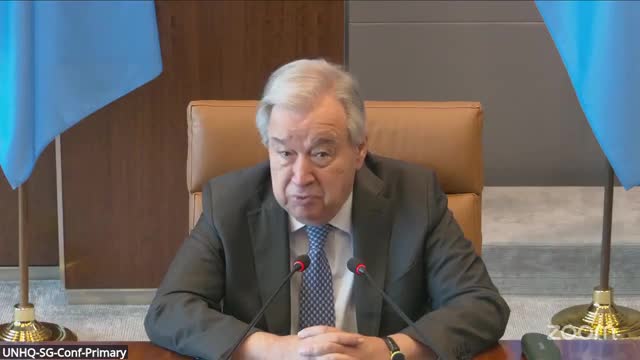UN Calls for Global Action on Human Rights Amid Rising Authoritarianism and Climate Challenges
July 26, 2025 | United Nations, Federal
This article was created by AI summarizing key points discussed. AI makes mistakes, so for full details and context, please refer to the video of the full meeting. Please report any errors so we can fix them. Report an error »

In a powerful address at the Amnesty International Global Assembly, UN Chief emphasized the urgent need for grassroots movements to address the ongoing Gaza crisis, framing it as a moral test for global conscience. He called on leaders worldwide to recognize their obligations to uphold human rights, stating that these rights are not the problem but rather the solution to achieving peace and progress.
The UN Chief highlighted the alarming rise of authoritarian practices globally, which threaten to undermine respect for human rights and democracy. He pointed out that political opposition is being crushed, accountability is being dismantled, and the rule of law is being disregarded in many nations. This trend is not isolated; it represents a broader global challenge that requires collective action.
He underscored the critical role of civil society, describing it as the lifeblood of any free nation. However, he noted that activists and journalists are increasingly silenced, with some facing severe consequences, including violence. The situation for women and girls, particularly in places like Afghanistan, remains dire, as their basic rights are stripped away.
The UN Chief called for a united front to confront these injustices, urging countries to defend human rights consistently, even when it is inconvenient. He stressed the importance of holding nations accountable for human rights violations and ensuring that commitments to protect civic space and gender equality are honored.
Additionally, he addressed the role of digital technology in amplifying these issues, warning that social media manipulation has become a tool for authoritarian regimes. He called for action to combat the spread of misinformation and hate online, which fuels division and undermines societal cohesion.
In conclusion, the UN Chief's remarks serve as a rallying cry for communities and leaders alike to stand together in defense of human rights, emphasizing that the fight for justice and equality is more crucial now than ever. The outcomes of this assembly could shape the future of human rights advocacy and the global response to crises like that in Gaza.
The UN Chief highlighted the alarming rise of authoritarian practices globally, which threaten to undermine respect for human rights and democracy. He pointed out that political opposition is being crushed, accountability is being dismantled, and the rule of law is being disregarded in many nations. This trend is not isolated; it represents a broader global challenge that requires collective action.
He underscored the critical role of civil society, describing it as the lifeblood of any free nation. However, he noted that activists and journalists are increasingly silenced, with some facing severe consequences, including violence. The situation for women and girls, particularly in places like Afghanistan, remains dire, as their basic rights are stripped away.
The UN Chief called for a united front to confront these injustices, urging countries to defend human rights consistently, even when it is inconvenient. He stressed the importance of holding nations accountable for human rights violations and ensuring that commitments to protect civic space and gender equality are honored.
Additionally, he addressed the role of digital technology in amplifying these issues, warning that social media manipulation has become a tool for authoritarian regimes. He called for action to combat the spread of misinformation and hate online, which fuels division and undermines societal cohesion.
In conclusion, the UN Chief's remarks serve as a rallying cry for communities and leaders alike to stand together in defense of human rights, emphasizing that the fight for justice and equality is more crucial now than ever. The outcomes of this assembly could shape the future of human rights advocacy and the global response to crises like that in Gaza.
View full meeting
This article is based on a recent meeting—watch the full video and explore the complete transcript for deeper insights into the discussion.
View full meeting